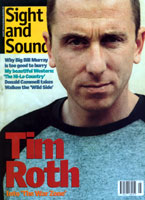Primary navigation

France/Belgium/United Kingdom 1998
Reviewed by Keith Reader
Our synopses give away the plot in full, including surprise twists.
Vincent Malivert directs a jewellery business in Paris' Place Vendôme. His wife Marianne was once an ambitious dealer, but she slid into alcoholism. Vincent's business is riddled with debts and his creditors are closing in. Realising his position is hopeless, he shows the now-sober Marianne seven magnificent diamonds he is proposing to hide from his creditors. Vincent's assistant Nathalie is in the process of leaving her lover Jean-Pierre for jewel-dealer Battistelli. Vincent commits suicide, leaving Marianne at the helm of the business but she refuses to surrender the stones to her husband's creditors.
In Antwerp, she discovers Battistelli is also trying to get his hands on them. She and Jean-Pierre become lovers. A flashback reveals that many years ago Marianne had been in love with Battistelli. He used her to pass on some stolen gems and abandoned her, thus precipitating her alcoholism. Ostensibly to sell him the diamonds, Marianne makes an appointment to meet Battistelli which the creditors will then discover about his person. She tells Battistelli the creditors are lying in wait for him, and the two flee to Ostend, where they spend a night in separate beds in a hotel room, admitting they were not made for each other. The creditors turn up, tipped off by Battistelli who believes he can negotiate his way out of trouble with them. Later, Marianne is pursued by Jean-Pierre on the beach; she asks if he always runs after women who run from him.
Although she's best known as an actress, Nicole Garcia has directed four feature films including Place Vendôme. In Un week-end sur deux she drew a superb turn from Nathalie Baye, playing a fraught but powerful woman similar to Garcia's own best-known role in Resnais' Mon oncle d'Amérique. Catherine Deneuve here belongs to the same family, giving a performance that ranks as one of the finest of her middle age.
As in André Téchiné's Ma saison préférée, the bodily filling out characteristic of that time of life serves to give her character more gravitas than in many previous incarnations. Eyes and gesture do most of the work - hers is not a verbose role - in her evocation of the iconically named Marianne, whose initial near-catatonia gives way to assertiveness. By the end she is multiply in charge: restored to solvency; capable of dealing with former lovers, whether defaulters from the past (Battistelli) or pursuers in the present (Jean-Pierre); and even (supposedly impossible for a recovering alcoholic) capable of social drinking in moderation. The other performances inevitably tend to look like mere foils to Deneuve's. Emmanuelle Seigner's mannered flouncings irritated this reviewer, but Jacques Dutronc exudes a convincingly disreputable air as Battistelli. Jean-Pierre Bacri deserves credit for his masochistic cragginess, confirming after Un air de famille that he has what it takes as actor as well as screenwriter.
But Place Vendôme is more than a jewelcase for performers. It is subtly scripted, making discreetly resonant use of doublings: Nathalie with Marianne in her youth: Marianne and the disbarred lawyer Jean-Pierre brought together through a shared professional disgrace; Battistelli and Vincent as respectively treacherous and supportive father-figures to their trophy lover/wife. The film also puts on screen a world scarcely seen other than as the backdrop to Jules Dassin's Du rififi chez les hommes (1955) - one whose elegance is matched by its menace, rendered all the more sinister by the fact that no gun is drawn and no violence apart from Vincent's suicide takes place on screen. If the complexity of the intrigue and the genre stereotypes evoke the world of noir, the decor is at its antipodes - thick carpets, luxuriously panelled rooms, expensive cars. Nor could we be further from the gritty banlieue film or the all-gloss cinema du look.
In a curious way Place Vendôme has affinities with the heritage movie, reassuring us that the uppermost echelons of Parisian chic - the eponymous square and Catherine Deneuve - are still as potent as before. Garcia deploys her silky men in designer suits sparingly, making the frisson they generate all the more palpable (though the references to the Russian mafia, a seemingly inescapable component of end-of-the-millennium noir, appear clichéd). We see surprisingly little of the city for a largely Paris-set film, reinforcing the sense that the real action is elsewhere - in the echoing corridors and suave international train and car journeys of a ruthlessly stylish world.
The colonnaded elegance of the Place Vendôme is a spatial counterpart of Deneuve the ice maiden, but not until the very end do we find an equivalent for her character's fragility issuing in wonderfully understated strength. That is emphasised by the scrubby Ostend dunes of the final sequence, deserted save for Marianne and the limpet-like Jean-Pierre, whose desperate loyalty has provided an ironic counterpart to her development throughout. Altogether, Place Vendôme is a film whose performances and settings yield immense pleasure.